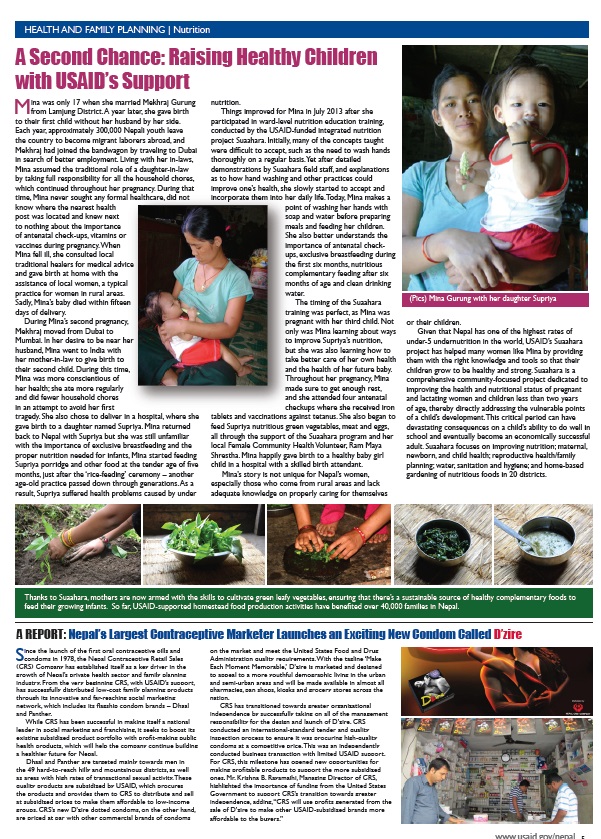Mina was only 17 when she married Mekhraj Gurung from Lamjung District. A year later, she gave birth to their first child without her husband by her side. Each year, approximately 300,000 Nepali youth leave the country to become migrant laborers abroad, and Mekhraj had joined the bandwagon by traveling to Dubai in search of better employment. Living with her in-laws, Mina assumed the traditional role of a daughter-in-law by taking full responsibility for all the household chores, which continued throughout her pregnancy. During that time, Mina never sought any formal healthcare, did not know where the nearest health post was located and knew next to nothing about the importance of antenatal check-ups, vitamins or vaccines during pregnancy. When Mina fell ill, she consulted local traditional healers for medical advice and gave birth at home with the assistance of local women, a typical practice for women in rural areas. Sadly, Mina’s baby died within fifteen days of delivery.
During Mina’s second pregnancy, Mekhraj moved from Dubai to Mumbai. In her desire to be near her husband, Mina went to India with her mother-in-law to give birth to their second child. During this time, Mina was more conscientious of her health; she ate more regularly and did fewer household chores in an attempt to avoid her first tragedy. She also chose to deliver in a hospital, where she gave birth to a daughter named Supriya. Mina returned back to Nepal with Supriya but she was still unfamiliar with the importance of exclusive breastfeeding and the proper nutrition needed for infants, Mina started feeding Supriya porridge and other food at the tender age of five months, just after the ‘rice-feeding’ ceremony – another age-old practice passed down through generations. As a result, Supriya suffered health problems caused by under nutrition.
Things improved for Mina in July 2013 after she participated in ward-level nutrition education training, conducted by the USAID-funded integrated nutrition project Suaahara. Initially, many of the concepts taught were difficult to accept, such as the need to wash hands thoroughly on a regular basis. Yet after detailed demonstrations by Suaahara field staff, and explanations as to how hand washing and other practices could improve one’s health, she slowly started to accept and incorporate them into her daily life. Today, Mina makes a point of washing her hands with soap and water before preparing meals and feeding her children. She also better understands the importance of antenatal check-ups, exclusive breastfeeding during the first six months, nutritious complementary feeding after six months of age and clean drinking water.
The timing of the Suaahara training was perfect, as Mina was pregnant with her third child. Not only was Mina learning about ways to improve Supriya’s nutrition, but she was also learning how to take better care of her own health and the health of her future baby. Throughout her pregnancy, Mina made sure to get enough rest, and she attended four antenatal checkups where she received iron tablets and vaccinations against tetanus. She also began to feed Supriya nutritious green vegetables, meat and eggs, all through the support of the Suaahara program and her local Female Community Health Volunteer, Ram Maya Shrestha. Mina happily gave birth to a healthy baby girl child in a hospital with a skilled birth attendant.
Mina’s story is not unique for Nepal’s women, especially those who come from rural areas and lack adequate knowledge on properly caring for themselves or their children.
Given that Nepal has one of the highest rates of under-5 undernutrition in the world, USAID’s Suaahara project has helped many women like Mina by providing them with the right knowledge and tools so that their children grow to be healthy and strong. Suaahara is a comprehensive community-focused project dedicated to improving the health and nutritional status of pregnant and lactating women and children less than two years of age, thereby directly addressing the vulnerable points of a child’s development. This critical period can have devastating consequences on a child’s ability to do well in school and eventually become an economically successful adult. Suaahara focuses on improving nutrition; maternal, newborn, and child health; reproductive health/family planning; water, sanitation and hygiene; and home-based gardening of nutritious foods in 20 districts.








Comment
Make a general inquiry or suggest an improvement.